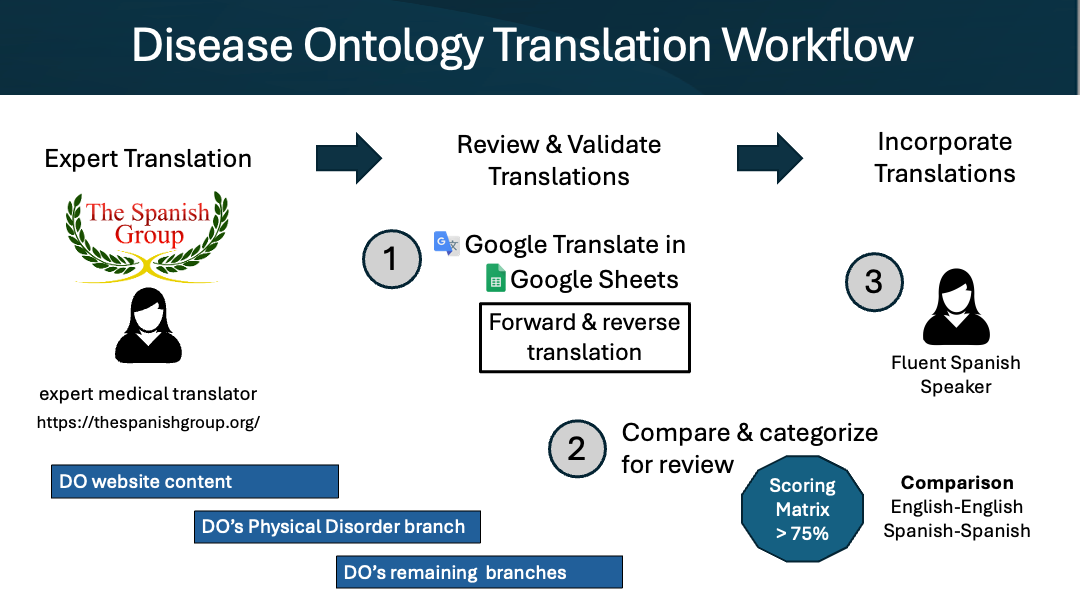DO Translation
The Human Disease Ontology (DO) and disease-ontology.org are now available in Spanish!
This page provides information on:
- How to access the translated content
- The translation workflows used
- Conventions for DO-related translation
- How to contribute to translation
How to Access Translated Content

Use the language selector in the menu at the top of any page to switch between English and Spanish. The language selector toggles both the website language and the language of ontology terms in the OBO & OWL browsers and searches. Selection will persist across all pages during a browser session. The default language is English.
Some programmatic services, and the API Swagger Documentation, do not yet support translated text:
- SPARQL Sandbox and SPARQL endpoint
- Faceted Search
- API
Please contact us if you would like us to prioritize making these services available in Spanish.
Ontology Files
Using IRIs (aka PURLs) to access ontology files is strongly recommended. IRIs are persistent identifiers that will reliably access the latest version of the ontology files, regardless of where they are stored. The files available with their IRIs are:
-
International version (all languages included):
http://purl.obolibrary.org/obo/doid/translations/doid-international.owl - Spanish-only versions
-
doid-es.owl (RDF/XML):
http://purl.obolibrary.org/obo/doid/translations/doid-es.owl -
doid-es.obo:
http://purl.obolibrary.org/obo/doid/translations/doid-es.obo
-
doid-es.owl (RDF/XML):
Files can also be located on GitHub in the src/ontology/releases/translations directory of the HumanDiseaseOntology GitHub repository. Detailed information about accessing ontology files can be found in README-release-files.md.
Spanish Translation Workflows
For detailed information, refer to our presentation at the 18th Annual International Biocuration Conference (available on figshare) titled DO Spanish: enhancing accessibility via a standardized workflow for translating ontology and website content
Website Text
The first translation of website text was completed by professional medical translators at The Spanish Group prior to any translation of ontology terms. These translations were reviewed by fluent Spanish speakers on the DO team and found to be highly accurate except for ontology-related technical terminology, which medical translators would be unfamiliar with. As part of this review, the DO team established standards for named entities (like "Human Disease Ontology") and manually revised ontology-related terminology and explanatory text.
All subsequent translation of website text to Spanish is done immediately after updates to English (new or changed text) with Google Translate and then reviewed by fluent Spanish speakers on the DO team, or handled directly by a fluent speaker on the DO team (for minor changes). Prior translation trials demonstrated that Google Translate is also highly accurate for Spanish translation, including ontology-related text.
Website language switching is handled by the Python Babel library for text and server-side logic for OBO & OWL tree browsers and search.
Ontology Terms
A three-step protocol was used to ensure high quality translation of ontology text to Spanish.

- Ontology term labels, definitions, and synonyms were translated by professional medical translators at The Spanish Group.
- The same English text was translated to Spanish and professional Spanish translations were back translated to English using Google Translate and used to calculate a translation quality score, computed as the average similarity between the English-paired text and the Spanish-paired text.
-
Guided by translation quality scores, translated text was handled as follows:
- Exact matches across both languages were accepted without review.
- Comparisons scoring above a threshold were accepted, and will be minimally reviewed as time permits (0-1 scale, 1 best; threshold for labels & synonyms = 0.75, definitions = not yet determined).
- Comparisons scoring at or below the threshold are carefully reviewed by DO team members prior to inclusion into the ontology**.
**An appropriate threshold for definitions has not yet been determined. Until determined, professional medical translations of definitions will be included in the ontology without review.
Recommended Conventions for Translation
When translating information about the ontology or website, the following conventions are recommended:
- Preserve named entities & abbreviations in their original English form. At first use a
descriptive translation may accompany the name in parentheses (e.g., "Human Disease Ontology
(ontología de enfermedades humanas)" for Spanish). The following are considered named entities:
- Disease Ontology Knowledge Base (DO-KB)
- Human Disease Ontology (DO)
- Disease Ontology (DO)
- DO-KB SPARQL Sandbox, or simply SPARQL Sandbox
- DO-KB Faceted Search, or simply Faceted Search
- DOID, or doid (this is the ontology identifier, not a named entity, but should never be translated)
- In languages with articles that may take multiple forms, such as Spanish, names may be preceded by an article (e.g., "la Disease Ontology") or may not ("Disease Ontology"). This is a stylistic choice and should be consistent. If used, select the article corresponding the translated name (e.g., in Spanish it would be "la Disease Ontology" based on the translated name "la ontología de enfermedades").
How to Contribute
There are many ways to contribute to the translation of the Disease Ontology:
- Use the ontology and disease-ontology.org and let us know if you find any translation errors or have suggestions for improvement.
- If you are fluent in Spanish & English, volunteer to Review translations. New disease terms are being created all the time.
- Help with outreach to promote the availability of the DO in Spanish.
-
The DO team hopes to provide the ontology in additional languagues in the near future. If you
are fluent in English and another language, volunteer to help us translate the DO into that
language. The top 10 languages of greatest interest for translation are those, after
English, most used to access disease-ontology.org:
- Chinese
- Dutch
- Finnish
- French
- German
- Italian
- Japanese
- Korean
- Portuguese
- Spanish
To get involved, use the Contact Us page, or open or participate on a GitHub issue or discussion in the Human Disease Ontology repository. Community contributions are greatly appreciated. Check out our Registry of Contributors.